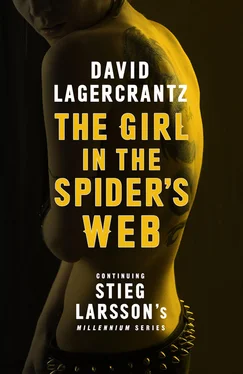“It goes to her head.”
“It gives her a sense of power. When she smiles, we melt. When she doesn’t, we feel excluded, and do absolutely anything to see her beam again. Camilla learned early on to exploit that. She became expert at it, a mistress of manipulation. She had large, expressive doe eyes.”
“She still does.”
“Lisbeth told me how Camilla would sit for hours in front of the mirror, practising her look. Her eyes were a fantastic weapon. They could both bewitch you and freeze you out, make children and adults alike feel special one day and rejected the next. It was an evil gift and, as you might guess, she soon became very popular at school. Everyone wanted to be with her and she took advantage of it in every conceivable way. She made sure that her classmates gave her small presents daily: marbles, sweets, small change, pearls, brooches. And those who didn’t, or generally didn’t behave as she wanted, she wouldn’t even look at the next day. Anyone who had ever found themselves basking in her radiance knew how painful that was. Her classmates did everything they could to be in her good graces. They fawned over her. With one exception, of course.”
“Her sister.”
“That’s right, and so Camilla turned them against Lisbeth. She got some fierce bullying going — they pushed Lisbeth’s head into the toilet and called her a freak and a weirdo and all sorts of names. This went on until one day they found out who they were picking on. But that’s another story, and one you’re familiar with.”
“Lisbeth doesn’t turn the other cheek.”
“No indeed. But the interesting thing in this story from a psychological point of view is that Camilla learned how to dominate and manipulate her surroundings from an early age. She worked out how to control everybody, apart from two significant people in her life, Lisbeth and her father, and that exasperated her. She put a vast amount of energy into winning those fights as well, and she needed totally different strategies for each of them. She could never win Lisbeth over, and pretty soon I think she gave up. In her eyes, Lisbeth was simply strange, just a surly, stroppy girl. Her father, on the other hand...”
“He was evil through and through.”
“He was evil, but he was also the family’s centre of gravity. He was the one around whom everything revolved, even if he was rarely there. He was the absent father. In a normal family such a figure can take on a quasi-mystical status for a child, but in this case it was much more than that.”
“In what way?”
“I suppose I mean that Camilla and Zalachenko were an unfortunate combination. Although Camilla hardly understood it herself, she was only interested in one thing, even then: power. And her father, well, you can say many things about him, but he was not short of power. Plenty of people can testify to that, not least that wretched lot at Säpo. No matter how firmly they tried to put their foot down, they still ended up huddled like a flock of frightened sheep when they came eyeball to eyeball with him. There was an ugly, imposing self-assurance about Zalachenko which was merely amplified by the fact that he was untouchable. It made no difference how many times he was reported to the social welfare agency — the Security Police always protected him. This is what persuaded Lisbeth to take matters into her own hands. But for Camilla, things were completely different.”
“She wanted to be like him.”
“Yes, I think so. Her father was her ideal — she wanted the same aura of immunity and strength. But most of all, perhaps, she wanted to be acknowledged by him. To be seen as a worthy daughter.”
“She must have known how terribly he mistreated her mother.”
“Of course she knew. Yet still she took her father’s side. One could say she chose to side with strength and power. Apparently even as a little girl she often said that she despised weak people.”
“She despised her mother too, do you think?”
“Unfortunately I think you’re right. Lisbeth once told me something which I’ve never been able to forget.”
“What’s that?”
“I’ve never told anyone.”
“Isn’t it about time then?”
“Well, maybe, but in that case I need a strong drink. How about a good brandy?”
“That wouldn’t be such a bad idea. But you stay right where you are, I’ll get some glasses and the bottle,” Blomkvist said, going to the mahogany drinks cabinet in the corner by the kitchen door.
He was digging around among the bottles when his iPhone rang. It was Zander, or at least his name was on the display. But when Blomkvist answered no-one was there; it must have been a pocket call, he thought. He poured out two glasses of Rémy Martin and sat down again next to Palmgren.
“So tell me,” he said.
“I don’t really know where to begin. But one fine summer’s day, as I understood it, Camilla and Lisbeth were both sitting in their bedroom. The door was locked.”
23. xi, Evening
August’s body stiffened again. He could no longer find the answers. The numbers were too big and instead of picking up his pencil he clenched his fists so that the backs of his hands whitened. He banged his head against the tabletop.
Salander should have tried to comfort him, or at least prevent him from hurting himself. But she was not entirely conscious of what was happening. Her mind was on her encrypted file. She realized she was not going to get any further by this route either. It was hardly surprising — how could August succeed where supercomputers had failed? Her expectations had been absurdly high from the start and what he had achieved was impressive enough. But still she felt disappointed.
She went out into the darkness to survey the barren, untamed landscape around her. Below the steep rock slope lay the beach and a snow-covered field with a deserted dance pavilion.
On a lovely summer’s day the place was probably teeming with people. Now it was empty. The boats had been pulled up on land and there was not a sign of life; no lights were shining in the houses on the other side of the water. Salander liked it. At least she liked it as a hiding place at the end of November.
If someone arrived by car she was unlikely to pick up the sound of the engine. The only possible place to park was down by the beach, and to get to the house you had to climb up the wooden steps over the steep rock slope. Under the cover of darkness, someone might be able to sneak up on them. But she would sleep tonight. She needed it. Her wound was still giving her pain — maybe that was why she had got her hopes up about August, against the odds. But when she went back into the house, she realized that there was something else besides.
“Normally Lisbeth isn’t someone who bothers about the weather or what’s going on beyond her immediate focus,” Palmgren said. “She blocks out everything she considers unimportant. But on this occasion she did mention that the sun was shining on Lundagatan and in Skinnarviksparken. She could hear children laughing. On the other side of the windowpane people were happy — perhaps that was what she was trying to say. She wanted to point out the contrast. Ordinary people were having ice cream and playing with kites and balls. Camilla and Lisbeth sat locked in their bedroom and could hear their father assaulting their mother. I believe this was just before Lisbeth took her revenge on Zalachenko, but I’m not sure about the sequence of events. There were many rapes, and they followed the same pattern. Zala would appear in the afternoon or evening, very drunk. Sometimes he would ruffle Camilla’s hair and say things like, ‘How can such a pretty girl have such a loathsome sister?’ Then he would lock his daughters into their room and settle down in the kitchen to have more to drink. He drank his vodka neat, and often he would sit quietly at first, smacking his lips like a hungry animal. Then he would mumble something like, ‘And how’s my little whore today?’ — sounding almost affectionate. But Agneta would do something wrong, or rather Zalachenko would decide that she had done something wrong, and then the first blow came, usually a slap followed by, ‘I thought my little whore was going to behave herself today.’ Then he would shove her into the bedroom and beat her. After a while slaps would turn to punches. Lisbeth could tell from the sounds. She could tell exactly what sort of blows they were, and even where they landed. She felt it as clearly as if she herself were the victim of this savagery. After the punches came the kicks. Zala kicked and shoved her mother against the wall and shouted ‘bitch’ and ‘tramp’ and ‘whore’, and that aroused him. He was turned on by her suffering. Only when Agneta was black and blue and bleeding did he rape her, and when he climaxed he would yell even fouler insults. Then it would be quiet for a while. All that could be heard was Agneta’s choked sobbing and Zala’s own heavy breathing. Then he would get up and have another drink and mutter and swear and spit on the floor. Sometimes he unlocked the door to the children’s room, and say something like, ‘Mummy’s behaving herself again now.’ And he would leave, slamming the door behind him. That was the usual pattern. But on this particular day something new happened.”
Читать дальше












